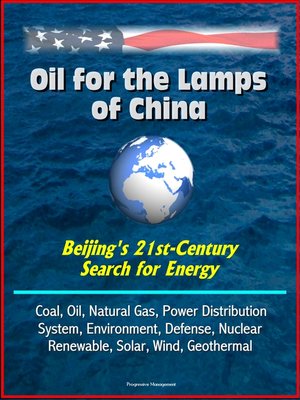Oil for the Lamps of China
ebook ∣ Beijing's 21st-Century Search for Energy: Coal, Oil, Natural Gas, Power Distribution System, Environment, Defense, Nuclear, Renewable, Solar, Wind, Geothermal
By Progressive Management

Sign up to save your library
With an OverDrive account, you can save your favorite libraries for at-a-glance information about availability. Find out more about OverDrive accounts.
Find this title in Libby, the library reading app by OverDrive.



Search for a digital library with this title
Title found at these libraries:
| Loading... |
Professionally converted for accurate flowing-text e-book format reproduction, this report examines energy sources and planning in the People's Republic of China. In 1933, Alice Tisdale Hobart, wife of the Standard Oil Company of New Jersey manager in Nanking, published Oil for the Lamps of China. Hobart had traveled widely in China and proved to be a very observant imperialist. Her fictional account of her experiences, not surprisingly, focused on the role played by Western businessmen, especially those engaged in importing and selling petroleum products. One thread that runs through her work is Chinese dependence on foreign sources of energy supplies, which remains the case today. This dependence on foreign-controlled sources means that Beijing's efforts to ensure the availability of energy resources adequate to fuel the nation's economic growth have important national security implications.
Chapter One - Energy Sector Organization * Chapter Two - The Coal Industry * Chapter Three - The Oil Industry * Chapter Four - The Natural Gas Industry * Chapter Five - Other Energy Sources * Chapter Six - The Power Distribution System * Chapter Seven - The Environment and the Energy Sector * Chapter Eight - Energy in the Ninth and Tenth 5-Year Plans * Chapter Nine - Defense of the Energy Sector * Chapter Ten - Conclusion * Endnotes
Beijing recognizes the strategic implications of national reliance on foreign energy sources and is attempting to lessen this reliance. China is the world's fifth largest petroleum producer but imported more than 18 percent of its petroleum consumption in 1999. It imported twice as much oil in 2000 as it did in 1999, and 15 percent more in 2002 than in 2001. The demand for imported petroleum will continue increasing, assuming continued economic growth, with imported oil contributing as much as 40 percent of all petroleum requirements by 2010 and with as much as 8 million barrels a day imported by China in 2020. Maintaining the rate of economic growth to which the Chinese people have become accustomed is key to sustaining the legitimacy of the current political system in China as its ideological basis erodes.






